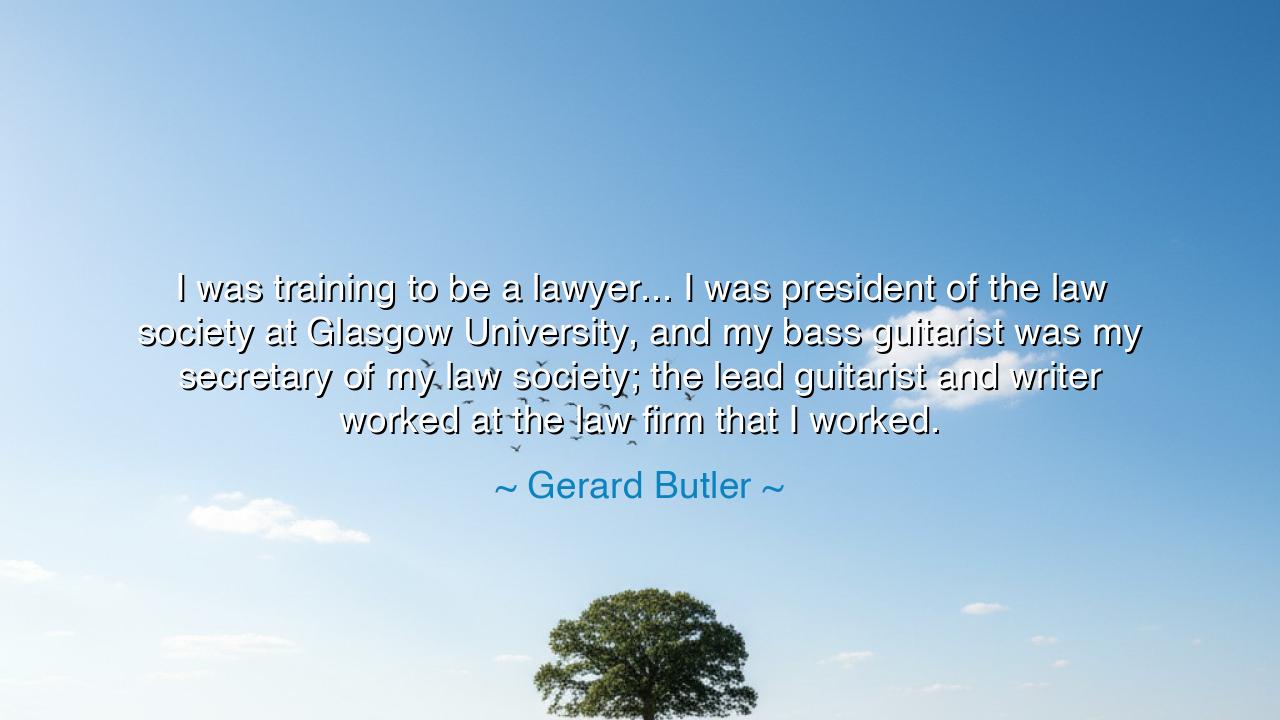
I was training to be a lawyer... I was president of the law
I was training to be a lawyer... I was president of the law society at Glasgow University, and my bass guitarist was my secretary of my law society; the lead guitarist and writer worked at the law firm that I worked.






The words of Gerard Butler, “I was training to be a lawyer... I was president of the law society at Glasgow University, and my bass guitarist was my secretary of my law society; the lead guitarist and writer worked at the law firm that I worked,” remind us that the journey of life is never straight, but woven of paths unexpected. In this remembrance, Butler reveals the paradox of destiny: that he once stood in the halls of law, surrounded not only by books of judgment and codes of justice, but also by the rhythm of music and the companionship of fellow dreamers. What appears at first as a curious anecdote is in truth a testimony to the hidden weaving of fate—where passion and duty, discipline and art, collide to forge the soul’s direction.
The origin of this saying lies in Butler’s youth, when he studied law at Glasgow, walking the respectable path set before him. He rose to president of the law society, a role of honor and responsibility, where ambition and intellect could have secured him a lifetime among barristers and courts. Yet around him were not only aspiring lawyers but also musicians—the bass guitarist who kept the society’s notes, the lead guitarist who toiled in the law firm by day and dreamed in chords by night. In this strange blending of professions, we see the eternal truth: no life is bound to one road alone, and often it is in the intersections—law and music, duty and joy—that the seeds of transformation are planted.
Consider the story of Cicero, the Roman statesman and orator. He was trained in the discipline of law and rhetoric, mastering the intricacies of justice. Yet his enduring legacy was not only in judgments but in the music of his speech, the artistry of words that moved the hearts of men. Just as Butler’s companions straddled the line between law and music, so Cicero showed that the greatest lawyers are not mere enforcers of law, but poets of justice, weaving reason and beauty together. The law needs music, and music, in its own way, seeks order like the law.
Butler’s reflection also carries a deeper message: the roles we hold in one season of life may prepare us for destinies we cannot yet see. Who would have imagined that the young man presiding over the law society with his guitarist friends would one day become a celebrated actor, embodying warriors and kings on the great stage of cinema? Yet it was precisely in those years—balancing law, friendship, and creativity—that his spirit was trained in discipline, leadership, and performance. Life wastes nothing; even when paths diverge, every step contributes to the making of the whole person.
There is also humility in these words. Butler does not boast of grandeur; he recalls with almost playful wonder that his law society was run not only by aspiring jurists but also by musicians who lived double lives. This humility teaches us that greatness does not always appear solemn or dignified. Sometimes the foundation of future triumph is laid in laughter, in unlikely friendships, in strange juxtapositions. The great mistake of society is to imagine that the serious alone produces greatness, while often it is the marriage of the serious and the joyful that produces souls capable of true brilliance.
The lesson for us is profound: never dismiss the strange combinations of your own journey. Do not despise the tension between duty and passion, for both may be necessary to shape your destiny. If you labor in an office by day but dream of art by night, know that these worlds are not wasted—they are forging in you a richness that a single path could not. If your companions seem mismatched to your profession, remember Butler’s tale: the bass guitarist may be your secretary today, but both of you may be preparing for futures beyond imagining.
Practical actions follow from this wisdom. Embrace the fullness of your life: the work that grounds you, the friendships that surprise you, the passions that stir you. Do not rush to abandon one for the other; instead, let them enrich each other until the time is ripe for destiny to reveal itself. Seek joy even in duty, and bring discipline even to your passion. And when the path shifts, as it did for Butler, step boldly into the unknown, knowing that nothing has been wasted—every note, every role, every responsibility has prepared you for the stage ahead.
Thus let Butler’s words be remembered as more than a tale of youthful days. They are a testament to the weaving of fate, the harmony of law and music, of duty and dream. Life is not a straight line but a symphony, and each instrument—whether law or guitar—contributes to the final song. Honor both your discipline and your passion, for together they shape the person you are destined to become.






AAdministratorAdministrator
Welcome, honored guests. Please leave a comment, we will respond soon